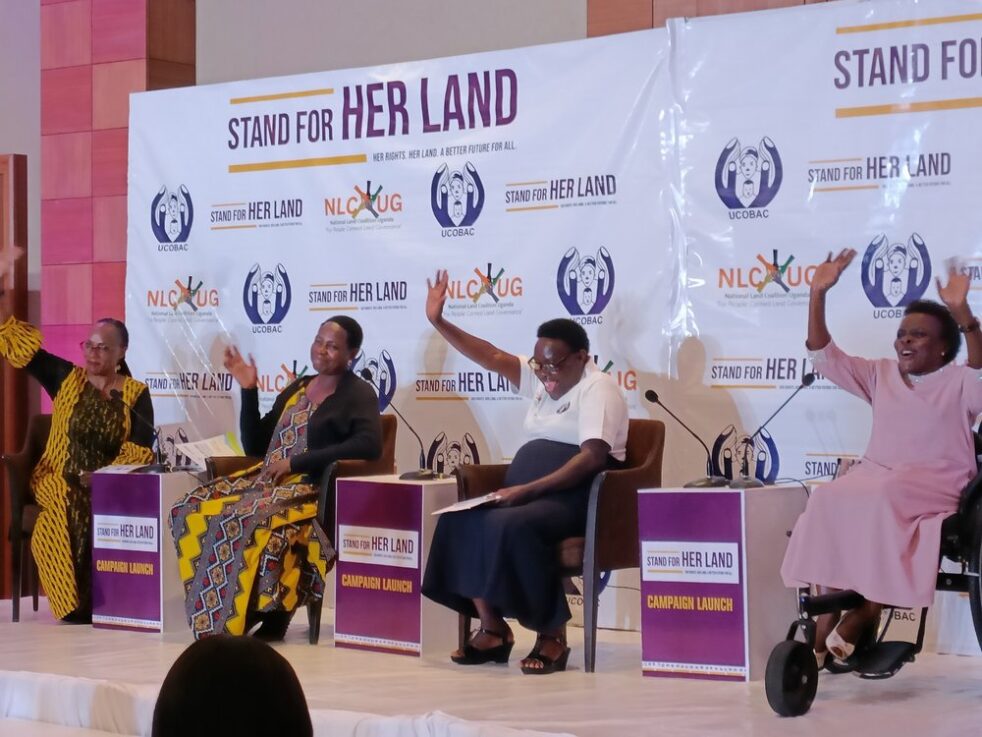This blog was originally published by ILC Africa.
By Kevin Eze, ILC Africa
The widening gap between women and men who own titled land in Uganda is the result of a “gap” between law and practice, concentrating land and power in the hands of a few, campaigners at the launch of Stand for Her Land (S4HL) have said.
Lack of access to and control over land is causing widespread suffering for rural women in Uganda, and even for women who hold Certificate of Customary Ownership (or CCO) the clash between culture and modernity threatens hardship for millions.
Only 20% of the land in Uganda is titled. Though the percentage of women holding titles rose from 15% in 1999 to 26% in 2022, that’s and about 0.05% of all titled land.

Dr. Doreen Kabusigye, facilitator of the National Land Coalition in Uganda, addressed participants during the 31 August 2022 launch of Stand for Her Land campaign, in Kampala.
Dr. Doreen Kabusigye, facilitator of the National Land Coalition in Uganda, told participants that the campaign “is timely for Uganda because it comes at a time when there is (a proposal of) review of laws on and around land – the 1998 Land Act, the Valuation Bill, the Land Acquisition Bill”, and the campaign can contribute to this from a women’s land rights lens.
She said: “Stand for Her Land campaign can be a good opportunity to push for the gazettement of the Succession Amendment Act passed into law in 2022. Through the National Land Coalition, the campaign can put women’s land rights in the process of policy review and implementation.”

In response to a question put to him by 2nd panel moderator Norah Owaraga, High Royal Highness the Lopirigo, Drani Stephen Izakare (l), confirmed that Certificates of Customary Ownership do not fully protect women.
The International Land Coalition in Africa reported in 2020 that women’s land rights can deliver economic justice: women with strong land rights and inheritance earn up to 3.8 times more income. Women’s land rights also help fight climate change since large-scale climate mitigation interventions are more effective when women’s land rights are fully recognized.
Securing women’s land rights could perhaps resolve over 50% of unequal gender power relations, economic injustice, gender-based violence, among rural, urban and indigenous communities living in poverty.

Frances Birungi (first from left) moderated the first panel when grassroots woman Nakibuuka Maxensia (first from right) called on campaigners to first seek the Customary Certificate of Occupancy.
Frances Birungi, Chairperson of the National Land Coalition, said: “This campaign can bridge the gap in women’s land rights through first, the transformation of social norms and cultural practices that prevent women from accessing, owning and controlling land; second, adequate financing, skilling and capacitating of land governance institutions to support women’s land rights; third, increased legal literacy on women’s land rights for all; fourth, enhanced access to land justice for women; and finally, strengthened participation, voice and agency of grassroots women in land governance.”
A grassroots woman concurred. She narrated what she has been through since the death of her husband in fighting to protect the land he left behind. Despite the limitations of the CCO, she encouraged all grassroots women to get it as a start. “Having a title gives power to women to go to the banks and request for a loan. That is a form of power. You cannot ask for any financial support without that document in our country,” Nakibuuka Maxensia said.

Hon. Persis Princess, the State Minister for Housing, Ministry of Lands, Housing and Urban Development (second from left) stood in front of campaigners, prior to cutting the tape symbolizing the campaign launch.
Esther Muiru, global advocacy director for Stand for Her Land, said all countries participating in the Stand for Her Land campaign have common threads. “We notice grassroots women’s leadership, voice and agency; we see coalition and movement building; are we see the effort to build on existing and past efforts,” she said.
The campaign is cognizant of the nexus between secure women’s land rights, climate change, women’s economic justice and rights, and food security, she said.
Campaigners sang “Support her, support her, a woman owning land is a better future for all”, as Hon. Persis Princess, the State Minister for Housing, Ministry of Lands, Housing and Urban Development cut the tape symbolizing the campaign launch.
The next phase has begun: the implementation that will “bridge the gap.”
—
Kevin Eze of ILC Africa reports from Kampala, with photo credits.

